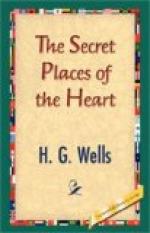The doctor and Sir Richmond walked round the walls, surveyed the shadow cast by Silbury upon the river flats, strolled up the down to the northward to get a general view of the village, had tea and smoked round the walls again in the warm April sunset. The matter of their conversation remained prehistoric. Both were inclined to find fault with the archaeological work that had been done on the place. “Clumsy treasure hunting,” Sir Richmond said. “They bore into Silbury Hill and expect to find a mummified chief or something sensational of that sort, and they don’t, and they report nothing. They haven’t sifted finely enough; they haven’t thought subtly enough. These walls of earth ought to tell what these people ate, what clothes they wore, what woods they used. Was this a sheep land then as it is now, or a cattle land? Were these hills covered by forests? I don’t know. These archaeologists don’t know. Or if they do they haven’t told me, which is just as bad. I don’t believe they know.
“What trade came here along these tracks? So far as I know, they had no beasts of burthen. But suppose one day someone were to find a potsherd here from early Knossos, or a fragment of glass from Pepi’s Egypt.”
The place had stirred up his imagination. He wrestled with his ignorance as if he thought that by talking he might presently worry out some picture of this forgotten world, without metals, without beasts of burthen, without letters, without any sculpture that has left a trace, and yet with a sense of astronomical fact clear enough to raise the great gnomon of Silbury, and with a social system complex enough to give the large and orderly community to which the size of Avebury witnesses and the traffic to which the green roads testify.




